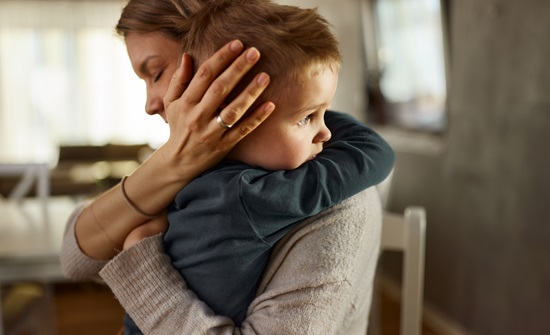Resources
Down Came the Rain: My Journey Throough Postpartum Depression (1995)
By Brooke Shields
Postpartum Support International
Phone: 800-944-4773
Website: www.postpartum.net

Parenting during the early years of your child’s life is a time of many demands and unique stresses. Even in the best of circumstances, it can be a challenging time for parents.
Adjustments usually need to be made in sleep schedules, employment, and roles. Even for experienced parents, there is the adventure of understanding the particular child's unique style, needs, vulnerabilities, and strengths. Maternal depression during this time can change an already challenging adventure into a potentially overwhelming one.

There are three forms of maternal depression:
Baby blues is the least severe and most common type of maternal depression. Symptoms usally include episodes of crying, mood swings, and worry. Symptoms usually start within the first few days following childbirth, and may last for a few hours up to several days. Although distressing, the symptoms do not cause significant parenting problems.
Postpartum Psychosis is a rare, yet very severe, mental illness. Symptoms include depression, along with hallucinations or delusions. These symptoms cause major problems with a new mother’s ability to function. This illness usually requires that the mother be hospitalized.
Postpartum depression is the third type of maternal depression. Typical signs and symptoms of postpartum depression include:
These symptoms co-occur for at least a two-week period of time. The symptoms cause significant distress and can impair a mother’s ability to parent. These symptoms are the same as those of “regular” depression that can occur at anytime during a person’s life. Depression is called postpartum depression if the symptoms begin within the first three months following childbirth.
Postpartum depression does not just affect the mother. It can be harmful to the baby and the entire family. Postpartum depression has been associated with problems with infant development, poor parent-child interactions, and unhealthy family functioning.
Women at-risk for postpartum depression can be identified early (even during pregnancy) by evaluating whether they have a history of depression. Past history of depression can increase a woman’s risk for postpartum depression. Once identified, steps can begin immediately to prevent problems for the mother, child, and the family. Moms-to-be can get services to build parenting skills, enhance parent- child relationship quality, and reduce depressive symptoms.
If a mother develops postpartum depression, treatment can help reduce symptoms. Treatment strategies also focus on strengthening family relationships by highlighting the role of fathers and other important caregivers, promoting positive parenting, establishing healthy family routines, and empowering parental self-efficacy.
Down Came the Rain: My Journey Throough Postpartum Depression (1995)
By Brooke Shields
Postpartum Support International
Phone: 800-944-4773
Website: www.postpartum.net